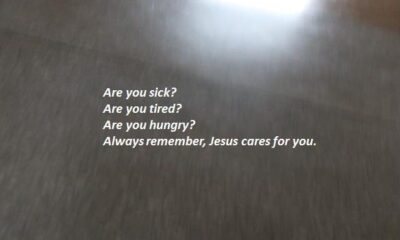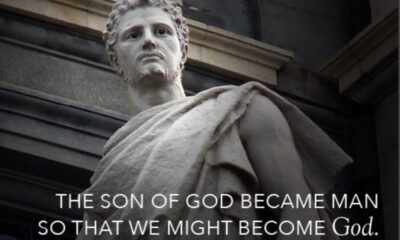Third Sunday Of Advent
Third Sunday of Advent (Year C)
Zeph 3.14-18; for Ps Isa 12; Phil 4.4-7; Lk 3.10-18
Gaudete! Rejoice!
1. On Advent Sunday the call was one to wake up and be vigilant. We were directed to look for the signs of Our Lord’s approach, the portents of the Second Coming. Last Sunday the scripture readings directed us to some of the practical means of preparation. Today the atmosphere lightens and this is reflected in many churches by the liturgical colour. The purple of preparation gives way to rose pink. We are allowed to be a little more light-hearted and cheerful. The keyword for the day is Gaudete, Rejoice!
2. Saint Paul, writing to the Philippians, says, “I want you to be happy, always happy in the Lord; I repeat, what I want is your happiness.” To find him in such a good mood surprises some people, whose perception of him is of a man always imposing warnings and restrictions on communities. However, Paul is the man who can proclaim his cheerful faith in the midst of persecution and torture and be light-hearted in prison. The foundation of his faith is rock-solid trust in God to provide all that is needful. This faith fills Paul’s heart with a deep-seated peace which he shares with us today. “There is no need to worry… that peace of God, which is so much greater than we can understand, will guard your hearts and your thoughts in Christ Jesus.” To have such peace and joy is the vocation of all of us.
3. To some extent this peace is a gift of God, but it is a gift that we can do something to acquire and develop. Catholic practices are there to help us. Our celebration of Mass this morning is that starting point. The assurance of the real presence of Christ on our altar, in our tabernacle and in our souls when we receive Holy Communion are fundamental, and the Church teaches, objective truths. They do not depend on how we feel or see things. The real presence is guaranteed by the promise of Christ and by the existence of the Catholic priesthood which He inaugurated at the Last Supper. Saint Paul held these truths as firmly as the most fervent Catholic today, as his Letters show.
4. Paul also found peace and joy in living the Christian life in every aspect. In the Gospel we have heard at Mass today, Jesus responds to the question from the people, what must we do? In His answer Our Lord combines spiritual and practical ideas. He tells His hearers to listen and respond to John the Baptist’s message of repentance and a new start: they must develop their faith. But He also stresses the significance of works: they must share their clothing with those who have none, be content with their pay and avoid injustice of various kinds. It is not hard to imagine the people who had asked the question sighing with impatience as they heard the answer – so much to do, and so difficult. By contrast, Saint Paul, like many of the Canonised and Beatified after him, seems to have found greater fulfilment and happiness the greater his commitment to serve Our Lord in every possible way.
5. Here we see the big difference between the Saints and those of us who are much less far along the path of holiness. For us, greater commitment so often seems a burden; for them it increases their joy and fills them with even deeper peace. The solution to our problem lies in our relationship with Our Lord. So long as we retain our pride and self-will, so long as we insist on seeing the world from our own point of view, so long as we see our Catholic faith and life as an “extra” then we will grasp at the obvious blessings but baulk at the commitments. If our hearts and minds are given over completely to Christ, then we shall see through His divine eyes and find our joy in responding to demands made on us as He would respond. Saint Paul, quite literally, was filled with Christ and knew peace and joy as a result.
6. In the Old Testament reading today, the prophet Zephaniah takes up the theme of rejoicing. “Rejoice, exult with all your heart… the Lord, the king of Israel, is in your midst.” Later in the passage Zephaniah goes on to speak about the initiative God takes: “He will exult with joy over you, he will renew you by his love; he will dance with shouts of joy for you as on a day of festival.” These words remind us that Saint Paul’s joy was not man-made but a divine gift. All our thoughts, emotions, reactions and responses, all that is part of our being, carries at least a memory of God himself. Although sin has marred God’s image and likeness within us, there are reminders of a time when humanity was not yet estranged from its Creator, traces in our fragmented lives of divine realities. Zephaniah’s message is that God is the source of joy and peace. So finding the spirit of Gaudete Sunday which Saint Paul urges on us is not an impossible task depending on our ingenuity and perseverance. Being joyful should not be hard work!
7. So the Prophet, like the Apostle, teaches us that the source of rejoicing is God himself. God dwells within us, and therefore the source of joy is also already within us, part of our being since our conception. “Great in your midst is the Holy One of Israel” proclaimed Isaiah. Finding joy in our faith is about release, relaxation, contentment and being at home with God and at ease with ourselves.
8. The Advent perspective helps us. We look forward to the coming of the Son of Man, to the inauguration of God’s kingdom. Throughout the Advent season we are reminded of signs of God’s kingdom breaking in, anticipating the fullness of what lies ahead for us. Though we vary in temperament as human beings, from the naturally ebullient and happy to the more sombre and serious, we can all think of moments when we have been, in a phrase of the writer C. S. Lewis, “surprised by joy”. This can happen even at the most serious, solemn or unexpected moment in everyday life, when laughter suddenly breaks in. In our religious life, both as individuals and also as a community of faith, the same is true. There are times of great enjoyment in our Catholic life, when prayer flows easily, when blessings abound, when hope is strong and progress along the path to salvation seems assured. These are experiences to seize and treasure and build on. They are examples of joy.
9. So, on Gaudete Sunday, we can all find cause to rejoice, both in our personal experience and in our Catholic community, from our past experience, our present blessings and our future hope. Saint Paul wants us to be happy. Our Lord wants us to be happy. God the Father wants us to be happy. So let us try to convince ourselves, if we need to, that we ourselves want to be happy. And then we shall find plenty of reasons to rejoice, past, present and anticipated. We have a lots of reason to rejoice!
Osho































